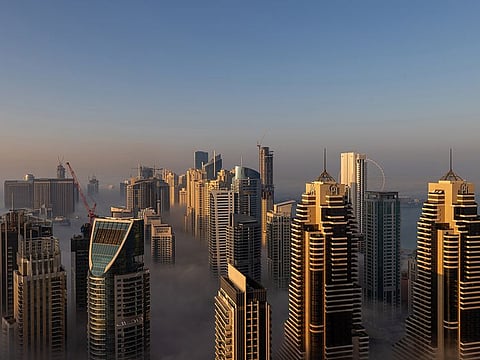Dubai's private developers start preparing for Dh55,000 cash limit in future property deals
More Dubai developers expected to bring in Dh55,000 limit to 'physical' cash payments

Dubai: Private developers in Dubai are expecting an imminent enforcement of rules related to all-cash property sales, with only up to Dh55,000 allowed to be used as 'physical' cash in future transactions.
Already, two of Dubai’s leading master-developers have enforced the plan, and the effect on the Dubai property market is already substantial, given that they combined account for 30-40 per cent of property sales in value terms. It was late last week that the two master-developers informed clients and partners about the decision to limit cash payments to Dh55,000, with the rest having to be processed through the banking channels.
Sources at private developers say they expect the authorities to soon bring in such upper limits on cash purchases across the board. “It’s unlikely that the Dh55,000 cut-off will only be followed by two master-developers,” said the CEO at a leading private developer. “Clearly, there is a move to bring down all-cash sales in the Dubai property market for greater transparency on such deals.”
Developer sources are hoping to complete whatever all-cash sales they are pursuing at the moment before any new rule comes into effect. Property deals that are done through 'physical' cash make up anywhere up to 20 per cent in Dubai at any given time. This could now wind down completely if the Dh55,000 'physical' cash limit is widely implemented.
Developers and brokers have already been required to stringently follow ‘track and trace at source’ the antecedents of their buyers.
What a leading Dubai developer did on cash payment ceiling
'According to our internal policy, cash transactions are now limited to Dh55,000 in aggregate per property, applicable to both the purchase and lease of land built units. This change is essential in maintaining the highest standards of financial integrity and transparency within the real estate sector.'
Expansion of AML rules
The Dh55,000 ceiling is an expansion of all the rules the UAE already has in place on anti-money laundering (AML) and KYC (know your customer) requirements.
According to Sameer Lakhani, Managing Director at Global Capital Partners, “Even if only part of the funding is done in cash and the rest through banking channels, the onus is still on the banks, brokers and developers to be clear about the source of funds and of the buyers’ KYC.”
Risk assessment
When it comes to risk assessments from a property deal perspective, these details need to be verified:
Even if only part of the funding is done in cash and the rest through banking channels, the onus is still on the banks...

Buyers must take note - brokers too
It’s not just about developers, brokers and banks working to ensure everything is as it should be.
Buyers too must exercise extreme caution in having all the facts ready as they too could face severe sanctions in case of omissions. "It’s not only the tax authorities that are watching - it’s the AML courts and the best-in-practice regime that the UAE has put into place," said an industry source.
"Given that there are clear best practice rules, the UAE authorities have shown a willingness to crack down on faulty deal making where AML rules are not followed," said Naqqash Ahmed, CEO of Capital Plus.
"They have sanctioned brokers for not reporting suspicious transactions. Brokers will need to take these rules seriously, because they potentially stand to lose their livelihoods if found to be at fault."
Dubai real estate has evolved into one of the strongest markets around the world. The strength is primarily based on well-defined regulations, including on AML. A well-regulated structure will ensure the system will avoid abnormal shocks by removing the possibility of 'ghost owners'

AML rules
The UAE authorities are ring-fencing all manner of transactions under AML regulations. "Real estate can absorb large amounts and often money launderers use this route to legitimize their ill-gotten funds through this route," said Atik Munshi, Managing Partner at Finexpertiza UAE. "To plug this route, regulators have not only framed the rules but monitor such transactions through various means."
Property buyers have to fulfil AML requirements whether they buy from a broker/agent or directly from the developer.
Real estate can absorb large amounts and often money launderers use this route to legitimize their ill-gotten funds through this route.

The UAE AML regulations classify real estate brokers as 'designated non-financial business and profession'. If the sales is handled directly by the developer, they too are required to follow the AML guidelines.
"Buyers need to know that they would be asked to furnish evidence of source of funds apart from other details when they want to purchase a property in UAE," said Munshi.
"Buyers need to be aware that any payment in cash of Dh55,000 (whether one time or in parts) would be under scrutiny as the developer/agent would report this to the central bank.
"Where an individual buyer arranges the funds through personal loan/gifts from family and friends, then too he/she should maintain adequate documents for the same. The loan/gift provider source of funds have to be proved as well.
"Purchases made through virtual assets (crypto currency) too would have to go through this exercise and prove the legitimacy."



